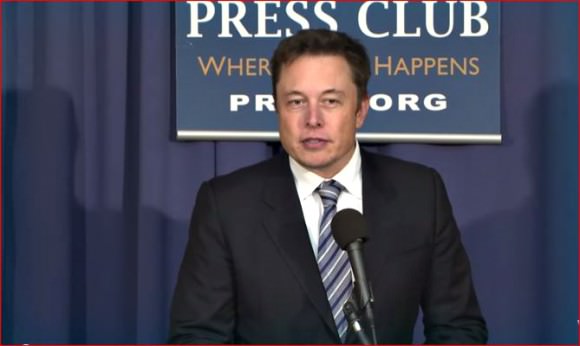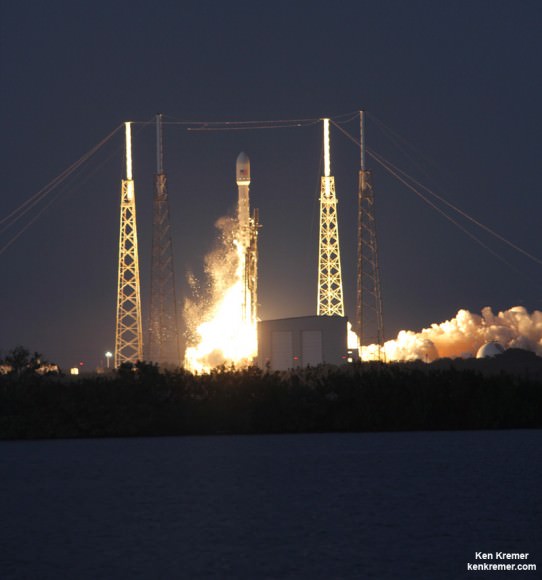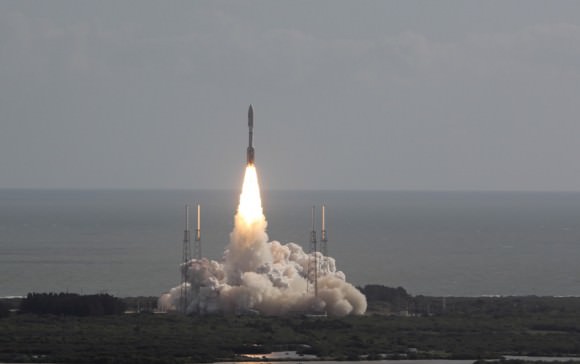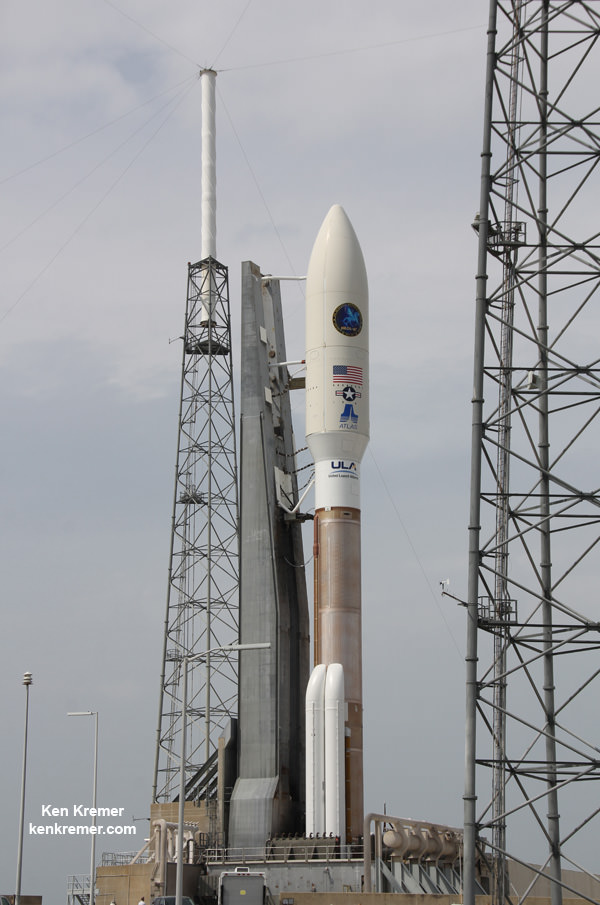United Launch Alliance Atlas V rocket – powered by Russian made RD-180 engines – and Super Secret NROL-67 intelligence gathering payload poised for launch at Space Launch Complex 41 at Cape Canaveral Air Force Station, FL, in March 2014. Credit: Ken Kremer – kenkremer.com
Story updated[/caption]
A US Federal Court has now issued a preliminary injunction that blocks the purchase and importation of Russian rocket engines by United Launch Alliance (ULA) for its Atlas V rocket used in National Security launches for the US Air Force after a filing by SpaceX. But what are the implications?
The US Federal Court of Federal Claims order was issued late Wednesday, April 30, by US Judge Susan G. Braden of the US Court of Federal Claims. The court order is in response to a protest filed by SpaceX against ULA and the US Air Force relating to the uncontested $11 Billion “block buy” launch contract purchase in December of 36 rocket cores for US National Security launches and is also related to US sanctions imposed after Russia’s recent actions in Ukraine and seizing and annexing the Crimea.
The temporary injunction marks a big win for SpaceX but immediately throws future National Security spy satellite and NASA science launches into uncertainty and potential disarray as I reported previously – here and here.
As I posted here last Friday, April 25, SpaceX CEO Elon Musk declared his firms intent to file suit against ULA and the Air Force on Monday, April 28 to break the launch monopoly.
Judge Braden’s injunction followed barely two days later.
Musk said the recent ‘block buy’ launch contract was unfair in blocking SpaceX from competing for launches of surveillance satellites, would cost taxpayers billions of extra dollars in coming years and should be recompetited.
“The national security launches should be put up for competition and they should not be awarded on a sole source, uncompeted basis,” Musk said at the April 25 briefing at the National Press Club in Washington, DC.

ULA quickly vowed today that they will respond to resolve the injunction and further stated that “This opportunistic action by SpaceX … ignores the potential implications to our National Security.”
Federal Judge Braden’s order specifically states the following; “The preliminary injunction prohibits the United States Air Force and United Launch Alliance, from making any purchases from or payment of money to NPO Energomash or any entity, whether governmental, corporate or individual, that is subject to the control of Deputy Prime Minister Rogozin.”
“IT IS SO ORDERED,” wrote Braden.
The engines at the heart of the Federal preliminary injunction are the RD-180 liquid fueled engines which power ULA’s Atlas V rocket and are manufactured in Russia by NPO Energomash – which is majority state owned by the Russian Federation and subject to the control of Russian Deputy Prime Minister Rogozin, who is specifically named on the US economic sanctions target list.
In response, Rogozin said that sanctions could “boomerang” against the US space program. He said that perhaps NASA should “deliver their astronauts to the International Space Station using a trampoline.”
Thanks to the utter folly of US politicians in shutting down the Space Shuttle program before a replacement crew vehicle was available and repeatedly slashing NASA’s commercial crew budget, American astronauts are now 100% dependent on the Russian Soyuz capsule for rides to the ISS and back for several more years ahead.
NASA has NO immediate alternatives to Russia’s Soyuz – period.
The rocket engine injunction is just the latest fallout impacting a vast swath of US space programs from National Defense to NASA stemming from the dangerously escalating crisis between Ukraine and the Russian Federation in the worst confrontation with the West since the Cold War era.
In response to the worsening Ukraine crisis, Western nations have instituted waves of increasingly harsh economic sanctions against Russia and several key members of the Russian government.
Judge Braden’s injunction stands until she receives clarification otherwise from US government entities that the engine purchase is not covered by the Federal government santions.
The order remains in effect “unless and until the court receives the opinion of the United States Department of the Treasury, and the United States Department of Commerce and United States Department of State, that any such purchases or payments will not directly or indirectly contravene Executive Order 13,661.”
ULA issued a swift statement today – received by Universe Today – from ULA’s general counsel Kevin G. MacCary, in response to Judge Braden’s preliminary injunction.
“ULA is deeply concerned with this ruling and we will work closely with the Department of Justice to resolve the injunction expeditiously. In the meantime, ULA will continue to demonstrate our commitment to our National Security on the launch pad by assuring the safe delivery of the missions we are honored to support.”
“SpaceX’s attempt to disrupt a national security launch contract so long after the award ignores the potential implications to our National Security and our nation’s ability to put Americans on board the International Space Station.”
The Atlas V rocket, powered by the Russian made RD-180 engines, will also be used as the launch vehicle by two of the three companies vying for the next round of commercial crew contracts aimed at launching US astronauts to the ISS. The contracts will be awarded by NASA later this year.
“This opportunistic action by SpaceX appears to be an attempt to circumvent the requirements imposed on those who seek to meet the challenging launch needs of the nation and to avoid having to follow the rules, regulations and standards expected of a company entrusted to support our nation’s most sensitive missions,” said ULA.
ULA is a joint venture between aerospace giants Boeing and Lockheed Martin, formed in 2006. It has conducted 81 consecutive launches with 100% mission success – including many NASA science and mission probes like Orion EFT-1, Curiosity, MAVEN, TDRS and more.
Judge Braden furthermore made clear that her order did not include prior RD-180 engine purchases.
“The scope of this preliminary injunction does not extend to any purchase orders that have been placed or moneys paid to NPO Energomash prior to the date of this
Order [April 30, 2014].”
ULA has a two year contingency supply of the RD-180’s and blueprints to begin production, if needed.
However in the event of a cutoff by Russia or US court injuncions, it would take ULA at least three to five years to start and certify RD-180 engine production somewhere in the US, a ULA spokesperson told me recently at Cape Canaveral.
This possibly leaves a 1 to 3 year gap with no Atlas V 1st stage engine supply.
SpaceX claims they can fill part of the launch gap. But their Falcon rockets are not yet certified for National Security launches.
“So far we are most of the way through the certification process. And so far there have been zero changes to the rocket. Mostly it’s just been a paperwork exercise.”
“In light of international events, this seems like the wrong time to send hundreds of millions of dollars to the Kremlin,” said Musk during the April 25 press briefing at the National Press Club in Washington, DC.

Watch for my continuing articles as the Ukraine crisis escalates and court orders fly – with uncertain and potentially dire consequences for US National Security and NASA.
Stay tuned here for Ken’s continuing SpaceX, Orbital Sciences, commercial space, Orion, Chang’e-3, LADEE, Mars rover, MAVEN, MOM and more planetary and human spaceflight news.

Credit: Ken Kremer – kenkremer.com

